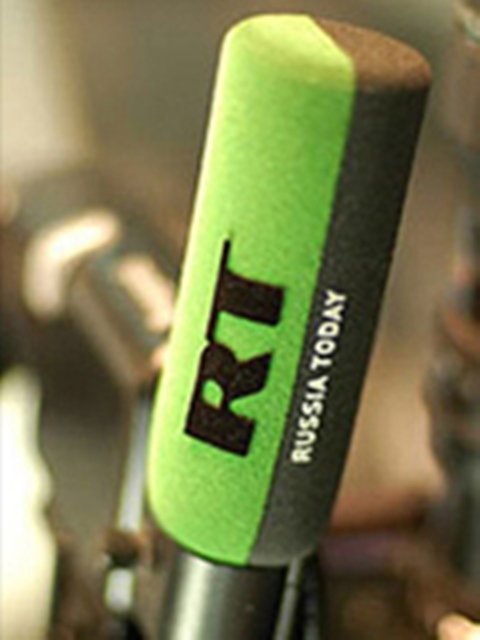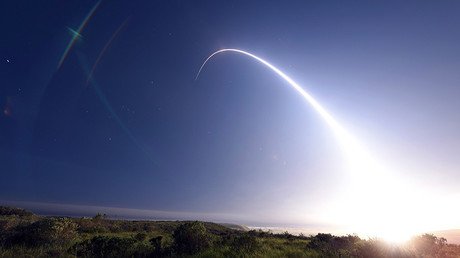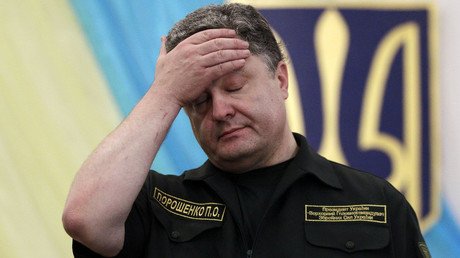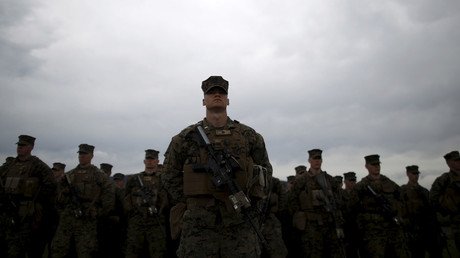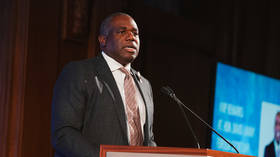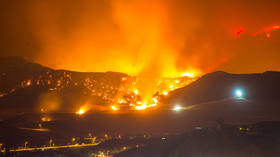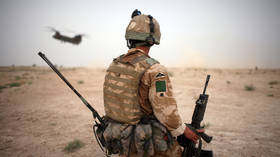NATO's Media Domination Tour, 2016
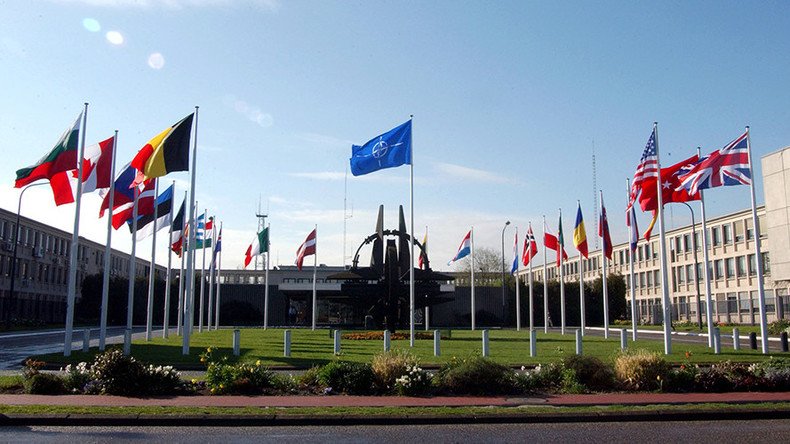
Lithuania’s Foreign Minister believes that Russia, and Russia alone, is responsible for the current crisis between Moscow and the West.
As is customary with NATO cheerleaders, Linas Linkevicius thinks that the ever-expanding military alliance – not to mention the sovereignty of the Baltic states – is threatened by Russia’s very existence.
Officials in the Baltic states, particularly in Lithuania and Estonia, are very fond of lashing out at Russia. Backed up by prominent anti-Russia voices in the think-tank establishment, their rhetoric becomes a lot more than hot air: they pollute discourse between East and West.
There are also internal dynamics at play. Blaming everything on a “Russian threat” masks these politicians own failures and management difficulties across a range of domestic issues.
In reality, Russia, as the National Interest recently pointed out, has no desire to attack the Baltics. In fact, the idea is completely unfathomable.
This reality doesn’t prevent western media from constantly warning that Moscow has nefarious intentions in the region, without any obvious grounds or providing any tangible evidence to confirm their assertions.
Only last month, Foreign Policy was lobbying for an increased NATO presence there, for no apparent reason. In January, Newsweek, now partnered with NATO’s Atlantic Council appendage, was “Counting Down to a Russian Invasion Of The Baltics,” no less.
The Root of All Fears
It’s becoming apparent that somebody, somewhere is lobbying hard to promote the notion that the Baltics are endangered. There is no rational justification for the concept. The Kremlin hasn’t made any notable threats against them.
While hardly overjoyed at their NATO membership, no prominent Russian officials have suggested it’s invalid in any sense. In fact, the most recent aggression in this sphere came late last year when the Balts threatened to “unplug” Russia's Kaliningrad exclave from a shared electricity system. Yes, that’s right – the aggressor was not Moscow.
So, if Russia poses no actual threat to the Baltics, where do these escalating tensions originate? Here’s one alternative theory: Speaking in London last week, William Perry, Bill Clinton’s former Defence Secretary admitted that the current hostility in US-Russian relations was caused in part by Washington’s contemptuous treatment of Moscow’s security concerns in the aftermath of the Cold War.
“Our first action that really set us off in a bad direction was when NATO started to expand, bringing in eastern European nations, some of them bordering Russia. At that time we were working closely with Russia and they were beginning to get used to the idea that NATO could be a friend rather than an enemy ... but they were very uncomfortable about having NATO right up on their border and they made a strong appeal for us not to go ahead with that,” Perry outlined at a Guardian event in London.
Perry explained that American officials had a contemptuous attitude towards Russia at that time. Of course, more recent comments by President Obama about Russia being only a “regional power” suggest this approach is still prevalent in Washington.
“It wasn’t that we listened to their argument and said we don’t agree with that argument,” Perry said. “Basically the people I was arguing with when I tried to put the Russian point ... the response that I got was really: ‘Who cares what they think? They’re a third-rate power.’ And of course that point of view got across to the Russians as well. That was when we started sliding down that path.”
In the context of US-abetted “regime-change” experiments in Ukraine and Georgia, Perry’s comments make a lot of sense. It’s clear that Washington wishes to decide what’s best for Eastern Europe and Eurasia, without taking any heed of what people in the region actually want. This is exemplified by Moldova, where US officials like John Kerry, Joe Biden and Victoria Nuland continuously press the idea of NATO membership, despite opinion polls showing that only 19% of Moldovans support the concept. America’s reaction to this figure, as it had been 31 percent previously, is to “expand security assistance.” This is obviously not what Moldovan voters are looking for.
Saving Russia from itself?
Last weekend, a curious summit was held in Vilnius, organized by the Ministry of Foreign Affairs of Lithuania. In attendance were the usual names from Russia’s so-called liberal opposition. Many of these are household names in western media and think-tank circles, but have very little name recognition inside Russia. In Vilnius, Artemy Troitsky, Lilia Shevtsova, Alexander Morozov, Masha Gessen, Ilya Ponomarev and Garry Kasparov (the one widely known name, but for his chess prowess, not his politics) showed up, along with myriad even-lesser lights.
These are the kind of people who believe Russia would be a perfect country if only the Americans could come and run it. It’s not surprising that all of them get plenty of hagiographic attention in the US press. For example, one participant, Alfred Koch, reported that proposals were made to give Syrian terrorists MANPADS to counter Russian forces assisting the state’s government.
Does anybody in NATO really believe that these folks are electable in Russia? Would Americans vote for candidates who suggested arming, for instance, the Taliban with rockets to fire at American soldiers? But, then again, as Moldova’s example proves, this crew doesn’t care about what actual Russians would vote for.
Fleet Street Lends a Helping Hand
Just before the Vilnius gathering, the western media and NATO did their best to drum up some popular support. The Observer published two reports from Riga, which basically read like NATO press releases. The first alleged that “Russia is deploying social media trolls in an attempt to effect political change, and Britain is not immune.” There was no mention of the fact that the British Army has openly admitted recruiting 1,500 troops as “Facebook warriors” (#DEFINITELYNOTSOCIALMEDIATROLLS). Indeed, The Observer’s sister-paper, The Guardian, carried the story last year.
In the second, the same journalist, Daniel Boffey, obediently repeated the silly NATO assertion that Russia is trying “to topple Angela Merkel” from her position as Germany’s Chancellor. The only source quoted was Jānis Sārts, “director of NATO’s Strategic Communications Centre of Excellence, based in Riga, Latvia.”
All roads lead to the Baltics?
A few days later, the young British neocon activist and author, Ben Judah, turned up in The Independent with another article mirroring NATO’s current messaging. Judah has been largely absent from the Russia scene since he published a debunked story in late 2014, saying that Putin had proposed that Russia and Poland divide Ukraine between them. The story was completely untrue and Polish officials flatly denied it.
#ICYMI General @PMBreedlove's #SASC testimony, you can read his #EUCOM2016 statement at https://t.co/QJ6ot862TYpic.twitter.com/5p8AnRsJr9
— U.S European Command (@US_EUCOM) March 1, 2016
Now he’s back, accusing Russia of “weaponizing” this and that and repeating the line that Moscow is trying to force Merkel out of her post in Berlin. In his piece, he pushes the two most important NATO talking-points: That Moscow is responsible for the Syrian refugee crisis (ridiculous, considering at least one million refugees came to Europe last summer BEFORE Russia entered the war). Also, that the Kremlin is responsible for the rise of the far-right in Europe (there is no mention of how EU immigration and austerity policies might be the actual, long-festering causes).
NATO's Media Ambitions
All this is just the latest PR blitz in NATO’s media domination tour, 2016. The interventionist US establishment, which dominates the institution, has been working the “Russian threat” angle for a while. These guys aren't happy with controlling over 95 percent of the popular media's foreign policy narrative. They want to oversee all of it.
As a result, nobody is allowed to have a point-of-view that challenges the party line. Especially people from Russia. Or anyone who might consider the Russian POV as valid. Instead, they will be attacked with psychological-operations (psy-ops), illegitimate asset seizures and ‘truth.’ Naturally, the legitimacy of ‘truth’ will be determined by how closely it adheres to the NATO party-line.
Established as an anti-Soviet military alliance, NATO hasn’t had an ostensible reason to exist since 1991. Yet, it has carried on to placate a number of vested interests, military and financial. Just not the ones set out in its actual mission.
As Russia was the central state in the USSR, NATO has decided to shape-shift into an anti-Russia grouping. This means that NATO has no incentive to mend fences, or build constructive relations with Moscow. Doing so would, literally, be suicidal for the alliance. Without a "Russian threat," there'd be no reason for NATO's continued existence. Thus, when no "Russian threat," is apparent, it must be invented.
NATO's advocates have replaced the Soviet Union with the Russian Federation, but Russia is not the USSR. It's not trying to export communism to the world. It doesn't maintain copious, far-flung foreign bases and in military terms, it spends barely more annually than the United Kingdom - and about 12% of what the US splurges.
In fact, Russia is arguably more inwardly focused in its priorities – economic, social and security – than at any time in the past 100 years.
The statements, views and opinions expressed in this column are solely those of the author and do not necessarily represent those of RT.
